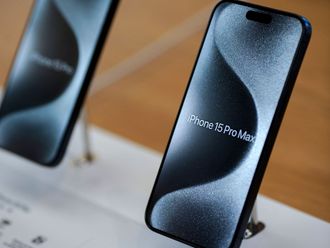Friday's Emmy announcement had me flashing back to 1978. It was a bad year. I won't go into all the rotten things that happened that year but, for me, the low-water mark of the year came on April 3. That was the day Star Wars was beaten by Annie Hall for Best Picture at the Oscars. I've never forgiven them for that.
Thanks to the Emmys, I'm reminded that 33 years later, science fiction still can't catch a break. Fringe, the TV series featuring an inter-dimensional fracas between two almost identical universes, didn't make the cut. Normally, I couldn't care less about the Emmys, but I was ticked off when I heard that John Noble, who plays two Walter Bishops, a lobotomised universe destroying super-scientist in one of the Fringe universes and the Secretary of Defence in the other, was not nominated. Noble deserved, at least, to get the nomination for his portrayal of both Bishops, if for no other reason than it was good acting, but it seems the old anti-Science Fiction card was played.
Science fiction has a long history of not getting any respect. Star Trek, the original series — the series everyone refers to whenever someone picks up an iPad and says "Ohhh, this is just like in Star Trek" — never won an Emmy. Oh, sure, they throw the genre a bone once in a while and give the award for Best Visual Effects when we include pretty lights (2001: A Space Odyssey and Star Wars) or a Best Art Direction when someone designs a futurist world (Star Wars again). However, even that's not a shoe-in. Blade Runner lost in both categories. This trend continued into the 1990s, with Star Trek: The Next Generation (ST:TNG), getting 18 Emmys, mainly for things like Sound Editing and Costume Design. It took seven seasons before ST:TNG was nominated for an Emmy for Best Dramatic Series (it lost). But even then, Drama? Really? Would adding a sci-fi/fantasy category kill them?
I'm sure that some of you will point out that the Big Bang Theory is yet again among the list of top comedy shows to get Emmy nominations, including nomination for Jim Parsons (Sheldon Cooper) and Johnny Galecki (Leonard Hofstadter), who play two of the biggest science geeks on tele-vision. Hey, I love the show too, but a cast of walking clichés who are often laughed at, as opposed to laughed with, doesn't really do much to promote science and technology with the masses.
Nerd rage
So is this just Nerd Rage on my part? Damn straight it is. The ability to imagine new science has been an art since the first geek learned to rub two sticks together to make fire. Geek? Sure, you don't think some bone-headed Neanderthal came up with fire, do you? It was the geek, probably too small to steal the best food or the warmest blanket, that came up with idea for fire. And he probably caught hell for it too, sitting there looking like an idiot and rubbing two sticks together while the other men were out hunting mastodons. As usual it went unappreciated until, in this case literally, the masses warmed up to the idea. (Quest for Fire? Best Academy Award for Make-Up.)
I once had a chance to interview Ursula K. Le Guin, one of the greatest science fiction and fantasy writers ever (five Hugo and six Nebula awards) and who talked to me about the need for reading and writing fiction. It all comes down to — and I'm summarising — thinking. It's fun to laugh at Leonard's and Peggy's love lives on The Big Bang Theory, but it is shows with more hard-core science that make us think. What separates artificial intelligence from real intelligence? Is our technology having a negative impact on the environment? And is it possible to build a light sabre? Apparently, that's not what wins awards. Look at last year's Academy Awards.
The King's Speech, which won last year's Best Picture, portrays King George VI's troubles with stuttering. Iron Man II, in which Robert Downey Jr. played a hero wearing an futurist exoskeleton, wasn't even nominated.
As much as I like Colin Firth, I'd much rather see a movie about an exoskeleton. Think I'm joking? Take a look at the HAL 5 currently in development by Tsukuba University in Japan. The HAL, which the company says is short for Hybrid Assistive Limb (HAL is also the name of the super-computer on board 2001: A Space Odyssey) is an exoskeleton being built by Cyberdyne Systems. And yes, for those of you paying attention, Cyberdyne was named after the fictional company that built the Terminator.
But despite the changes over the past 33 years, some things are still the same. You want to win an Oscar or an Emmy? Stick with something we've seen a thousand times before. Tell a love story. Rehash the life of a famous person. Make us laugh. But just don't make us think. You do that and your best hope for an award will be in sound editing.
Movies that stole the spotlight
- Annie Hall. The Woody Allen classic that stole the Oscar glory for Star Wars and Close Encounters of the Third Kind.
- The King's Speech. Other than Iron Man II, it also beat out the Social Network.
- Gandhi. OK, I'm not complaining that Gandhi beat out E.T. for best picture. I'm glad that happened, but it also stole the Best Visual Effects from Blade Runner.
- Best Cameos by a geek/ scientist/ in a TV show
- Stephen Hawking: A former Lucasian Professor of Mathematics, he's been on the Simpsons and Futurama, but he actually played his own hologram on ST:TNG.
- Steve Wozniak: Sheldon tells the Woz that he's his 15th favourite technological visionary.
- Serenity: We know it's a ship, but Joss Whedon called it the 10th character on Firefly, so we're including it here.
- The ship made cameos in Battlestar Galactica.










